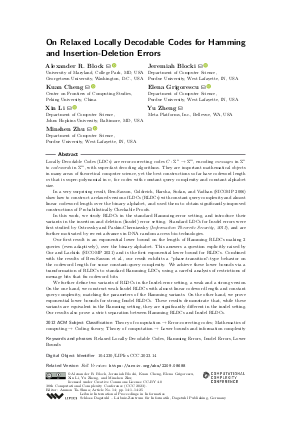@InProceedings{block_et_al:LIPIcs.CCC.2023.14,
author = {Block, Alexander R. and Blocki, Jeremiah and Cheng, Kuan and Grigorescu, Elena and Li, Xin and Zheng, Yu and Zhu, Minshen},
title = {{On Relaxed Locally Decodable Codes for Hamming and Insertion-Deletion Errors}},
booktitle = {38th Computational Complexity Conference (CCC 2023)},
pages = {14:1--14:25},
series = {Leibniz International Proceedings in Informatics (LIPIcs)},
ISBN = {978-3-95977-282-2},
ISSN = {1868-8969},
year = {2023},
volume = {264},
editor = {Ta-Shma, Amnon},
publisher = {Schloss Dagstuhl -- Leibniz-Zentrum f{\"u}r Informatik},
address = {Dagstuhl, Germany},
URL = {https://drops.dagstuhl.de/entities/document/10.4230/LIPIcs.CCC.2023.14},
URN = {urn:nbn:de:0030-drops-182847},
doi = {10.4230/LIPIcs.CCC.2023.14},
annote = {Keywords: Relaxed Locally Decodable Codes, Hamming Errors, Insdel Errors, Lower Bounds}
}

 Creative Commons Attribution 4.0 International license
Creative Commons Attribution 4.0 International license
































































